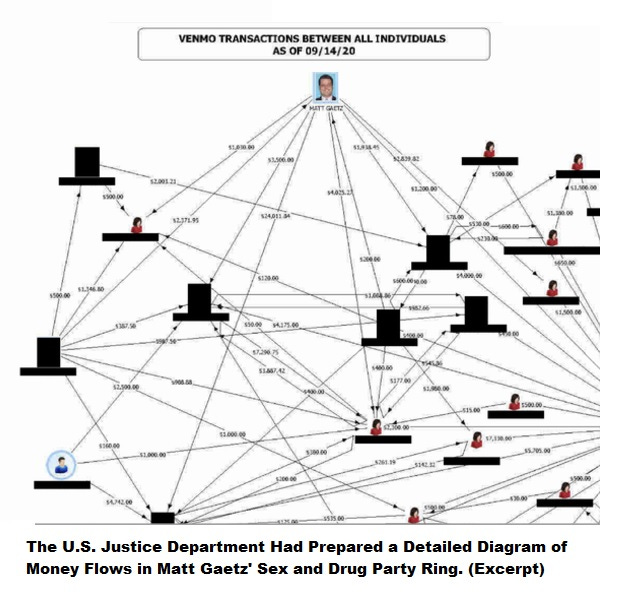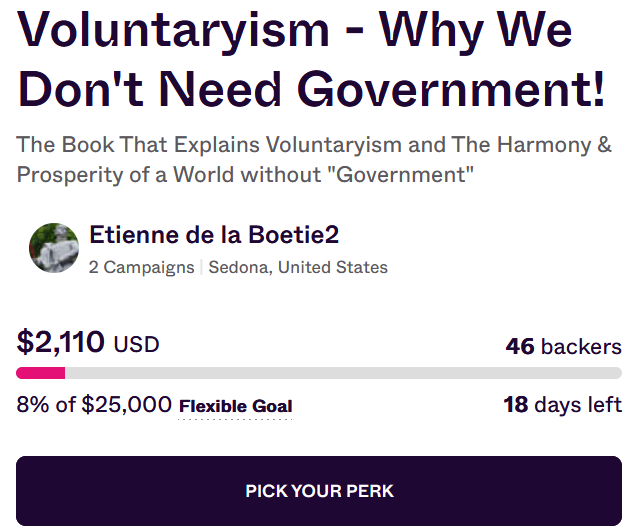Matt Gaetz Case Has Echoes of the Justice Department’s Failure to Prosecute Jeffrey Epstein’s Sex-Trafficking Ring
Today’s New York Times carries a diagram prepared by the U.S.
By Pam Martens and Russ Martens
Today’s New York Times carries a diagram prepared by the U.S. Department of Justice during its multi-year investigation into then Congressman Matt Gaetz. (We have printed the left-hand section of the diagram above.) The diagram illustrates the following about the DOJ’s investigation into the man that President-elect Donald Trump wants to install as the U.S. Attorney General – the top law enforcement officer at the U.S. Department of Justice:
The DOJ had receipts for the money flows between Matt Gaetz and the women he was paying for sex and the other individuals involved in the related sex and drug parties from 2017 to 2020.
The public also learned this past week from the attorney, Joel Leppard, who represented two of the young women who were paid for sex with Gaetz – that the DOJ had interviewed at least a dozen of the women whom Gaetz had paid for sex. These women are indicated on the diagram published by The Times with the dollar amounts paid.
Leppard explained to ABC News what motivated the young women to have sex with Gaetz and others at the parties:
“Leppard said his clients — one of whom was a [high school] student at the time — decided to attend the parties where they had sex with Gaetz and others in order to make enough money to pay rent.
” ‘It was that kind of situation where they’re literally, Hey, I got to make rent this month. Let’s go out and go to some of these events,’ and ‘Here’s how we’re going to pay rent.’ “
Despite sweeping evidence, payment receipts, depositions from at least a dozen witnesses, and testimony from a cooperating witness in the sex ring, Joel Greenberg, the DOJ failed to bring a single charge against then Congressman Matt Gaetz. That inaction came despite the fact that prostitution is illegal in all U.S. states with the exception of some counties in Nevada.
More importantly, a sitting member of Congress or the Executive Branch is viewed as being vulnerable to blackmail when they are hiding a history of crime.
To understand the DOJ’s timidity to go after Gaetz requires a broader understanding of how the DOJ has become compromised and intimidated by powerful people and their high-priced lawyers.
There are strong echoes in the Gaetz matter to how the Justice Department let Jeffrey Epstein off the hook in 2008 for sex-trafficking of dozens of underage high school girls despite a mountain of evidence and depositions compiled by the Palm Beach County police in Florida.
The U.S. Department of Justice cut a deal that allowed Epstein to serve just 13 months in jail from June 2008 to July 2009 – the majority of the time in a work release program where Epstein was driven to an office each day by his personal chauffeur.
Following the work release program, Epstein was required to spend one year under house arrest at his Palm Beach residence. But in a documentary series on Epstein, Filthy Rich, based on the nonfiction book by the same name, a Palm Beach police official explained what actually happened:
“He would violate his probation almost on a daily basis. There’s 11 pages here of just different violations. I think, I, myself, documented 66 different days that he violated his probation…He would go to New York, to his island, he would go to the airport, jump in his helicopter. Who knows where he went – without telling anybody. Every time I brought the probation office a case, they kept telling me the same thing. What would you like us to do? He’s a celebrity. I mean, just think about this: You have a pedophile out on probation – to violate probation in the state of Florida is illegal, except for Jeffrey Epstein.”
Despite having videotaped testimony from Epstein’s victims and statements confirming the abuse from a multitude of other witnesses, the U.S. Department of Justice allowed this pedophile to remain free – traveling throughout the United States and around the world on his private jets – sexually abusing girls and young women at his multiple mansions for another decade, until his arrest on July 6, 2019 on federal sex trafficking charges. Epstein died in a Manhattan jail on August 10, 2019 – just a little more than a month after his arrest. The New York City Medical Examiner ruled his death a suicide.
The Department of Justice was likely shamed into finally taking serious action against Epstein in 2019 by reporter Julie Brown’s explosive series on Epstein’s sex crimes that appeared in the Miami Herald newspaper in November 2018.
Wall Street On Parade’s detailed coverage of the Epstein case has centered on the fact that the largest federally-insured bank in the United States, JPMorgan Chase, was supplying Epstein with the tens of thousands of dollars in hard cash each month to pay off his victims as well as the young women he hired to recruit more school girls that he could sexually abuse or pimp out to his ultra-wealthy friends.
But notwithstanding the fact that JPMorgan Chase has a rap sheet that rivals that of an organized crime family, including five criminal felony counts, the U.S. Department of Justice has yet to bring a criminal case against the bank for aiding and abetting Epstein in his crimes – despite a mountain of detailed evidence developed by the Attorney General of the U.S. Virgin Islands, where Epstein owned his own so-called “Pedophile Island” and treated himself and his rich pals to sexually abusing young girls within the isolated confines of his tropical paradise.
The federal lawsuit filed by the Attorney General of the U.S. Virgin Islands alleged that JPMorgan Chase had “actively participated” in Epstein’s sex trafficking. A Memorandum of Law arguing for partial summary judgment in the case, that was filed by the Attorney General for the U.S. Virgin Islands, makes the following points:
“Even if participation requires active engagement…there is no genuine dispute that JPMorgan actively participated in Epstein’s sex-trafficking venture from 2006 until 2019. The Court found allegations that the Bank allowed Epstein to use its accounts to send dozens of payments to then-known co-conspirators [redacted] provided excessive and unusual amounts of cash to Epstein; and structured cash withdrawals so that those withdrawals would not appear suspicious ‘went well beyond merely providing their usual [banking] services to Jeffrey Epstein and his affiliated entities’ and were sufficient to allege active engagement.”
The U.S. Virgin Islands had previously advised the court on the unfathomable sums of hard cash that Epstein was able to take from the accounts he maintained at JPMorgan Chase without the bank filing the legally mandated Suspicious Activity Reports (SARs) to law enforcement. In the Memorandum linked above, it tallied up the giant pile of cash, writing as follows:
“Between September 2003 and November 2013, or approximately ten years, JPMorgan handled more than $5 million in outgoing cash transactions for Epstein — ignoring its own policy discouraging large cash withdrawals….”
The U.S. Virgin Islands’ attorneys cited to internal emails at JPMorgan Chase showing that employees at the bank were aware of Epstein’s “[c]ash withdrawals … made in amounts for $40,000 to $80,000 several times a month” while also being aware that Epstein paid his underage sexual assault victims in cash.
After a scorched earth campaign by JPMorgan Chase’s attorneys to humiliate the U.S. Virgin Islands in the media over its own unseemly political ties to Epstein, the case was settled, with JPMorgan Chase paying the U.S. Virgin Islands $75 million.
JPMorgan Chase’s involvement in the Epstein sex trafficking ring was also alleged in a class action lawsuit against JPMorgan Chase brought by lawyers David Boies and Bradley Edwards on behalf of Epstein’s victims. At a March 13, 2023 court hearing in the case, Boies argued in open court that JPMorgan Chase had used a private jet owned by the bank’s hedge fund, Highbridge Capital, to transport girls for Epstein’s sex trafficking operation.
With the criminal division of the U.S. Department of Justice still failing to take action against JPMorgan Chase for its alleged money laundering for Epstein, and the Boies/Edwards lawsuit on behalf of victims now settled for $290 million by JPMorgan Chase – with victims’ lawyers getting $87 million in legal fees and $2.5 million in expenses while victims are guaranteed nothing other than a requirement to release their claims – there is little hope that the American people will ever see sunshine in this matter.
According to court filings in the Epstein/JPMorgan Chase cases, Epstein was running a “sex-themed cult.” According to a deposition of a JPMorgan banker, the only money-generating business that Epstein had was tending to his “network.” According to witness testimony, fulfilling the sexual fantasies of powerful men in Epstein’s “network,” was how he obtained six opulent homes and hundreds of millions of dollars in wealth.
The information available to the public thus far suggests that Matt Gaetz, nominee to head the most powerful federal law enforcement agency in the U.S., was also running a sex/drug themed party circuit for himself and unnamed men – the black top hats in the diagram above — and the U.S. Department of Justice failed to bring charges against Gaetz.
It’s long past the time for an independent investigation into the compromised U.S. Department of Justice.
Our IndieGoGo for my new book: Voluntaryism - How the Only “ISM” Fair for Everyone Leads to Harmony, Prosperity and Good Karma for All! has raised $2110 from 46 backers or 8% of our $25,000 goal in less than a week with 18 days left! You can get some great perks for pre-ordering at https://www.indiegogo.com/projects/voluntaryism-why-we-don-t-need-government








let me guess selling ones body for greenbacks is a crime but dropping bombs on innocent people is acceptable policy! NY Slimes is spot on